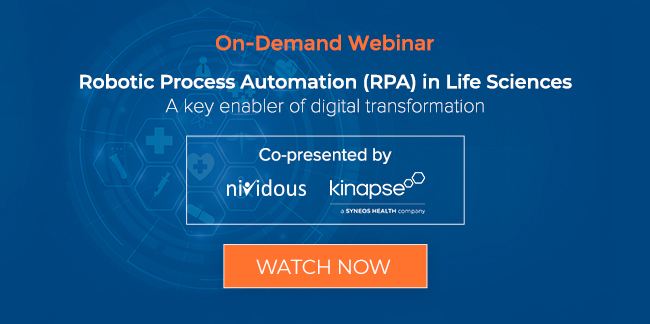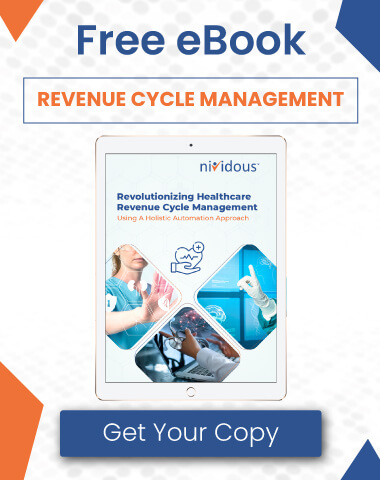Within the field of life sciences, there is a continuous call to develop new medicines at a quicker pace and lower cost. This desire to release new pharmaceuticals to the market while reducing the cost and time spent developing them has led to a rise in the use of technology in the healthcare field.
According to the Tufts Center for the Study of Drug Development, developers must improve their processes to reduce the cost and required time. Process improvements achieved in conjunction with the increased use of technology and more automated healthcare systems improve the timeline and accuracy of these operations.
Robotic Process Automation (RPA) is a growing technology that is used in many industries, including pharma and life sciences to increase the efficiency of tasks by automating jobs typically performed manually. The automation of time-intensive tasks allows employees to focus their efforts on the development of products and services which improves employee engagement and job satisfaction. The fast response times and around the clock availability of RPA creates a feeling of responsiveness that drives higher customer satisfaction. RPA is also easily integrated with existing technologies and is 100% accurate, leaving less room for human errors and inefficiencies.
There are several RPA use cases in the pharma, life sciences, and healthcare industry in general.
- Manual processes including billing, appointment scheduling, and case filing are automated to allow healthcare professionals to dedicate more of their time to patient care. These technological advancements also play a major role in streamlining processes, lowering costs, and increasing productivity.
- By linking back-office operations and front-end tasks, RPA technology can be used to improve the healthcare processes and create a secure system with enhanced data protection.
The advancements made with RPA in the healthcare industry can also be transferred to the field of life sciences to address the need of automating manual processes. Let us look at some of the selected challenges in the pharma/life sciences field.
- ~70% of Regulatory Affairs resources are consumed by lifecycle maintenance (LCM) activities. Many of these LCM activities are high volume, low complexity, non-strategic tasks.
- Regulatory (RIM) data quality is challenged by system silos, decentralized data capture, a lack of master data, and the need for multiple data entry.
- Pharmacovigilance case volumes are increasing at ~20% per annum, driven by new sources of AEs and the increasing use of real-world evidence.
- The drive for cost efficiency across life sciences operations is relentless as companies want to focus more investment in strategic programs to deliver new medicines to global patient populations.
- Organizations need to embrace flexible and scalable operating models, combining in-house, on-shore, off-shore, “captive” delivery centers and strategic delivery partners to remain competitive.
RPA can be a boon for life sciences companies to effectively eliminate these challenges. Swivel chair and data entry operations are often the initial targets. Moreover, when RPA is deployed in combination with other business process automation tools, it can help in streamlining end-to-end operations. RPA-enabled bots can connect disparate systems or systems with poor APIs in a non-intrusive way.
Amongst many other RPA use cases in the pharma industry, let us talk about the process of drug development. The time spent on the collection of data from clinical trials, consumer feedback, and tracking the adverse effects of drugs diminishes the focus of researchers and delays the process of drug development.
With the help of RPA, these processes can be assigned to a bot enabling researchers to spend more time on developing medication. Researchers can also use RPA to view and track historical and current pharmaceutical trends to improve drug development.
Moreover, by automating the data collection process, data can be accurately tracked and organized, making it easier to assess the risks and benefits of drugs as they are developed. By improving the data collection process, drug costs can be lowered, and time can be used more efficiently. Now, let us look at how RPA can be used to improve the completion of tasks.
Ways RPA Can Improve Completion of Tasks in the Field of Life Sciences:
| Task | Ways RPA Can Improve Completion |
| Pharmacovigilance Efforts | Healthcare organizations are required to track the effects of drugs on consumers. RPA can assist with compiling this information quickly and efficiently, so it can be easily reviewed. |
| Back-office Operations | Behind-the-scenes tasks such as data entry can be completed by a Bot through RPA, allowing employees to focus on patient care activities. |
| Clinical Trials and Consumer Feedback | Currently, manual processes are used to track consumer feedback and results of clinical trials. RPA can be used to automate these processes, eliminating the potential for error. |
| Regulatory Compliance | Improvements in first-time accuracy, end-to-end cycle time, and processing time achieved through RPA can make pronounced improvements in regulatory compliance. |
RPA can be a key technology in automating processes in the field of pharma/life sciences. By streamlining operations, compiling research and consumer feedback, and collecting data from clinical trials, robotic process automation can reduce the time and cost it takes to develop pharmaceutical drugs.






